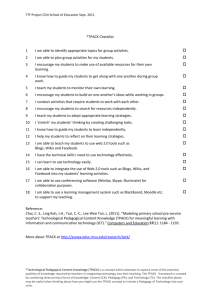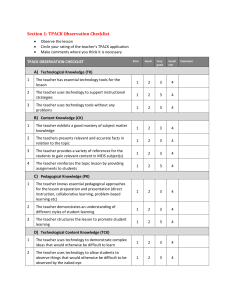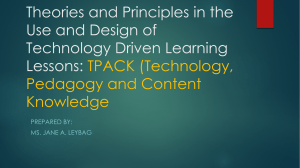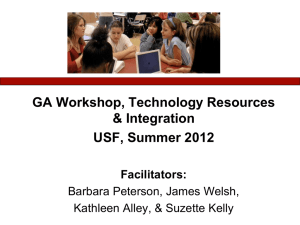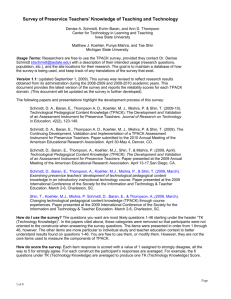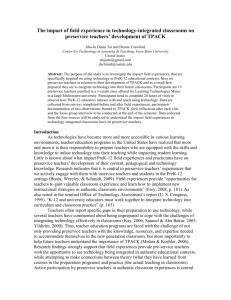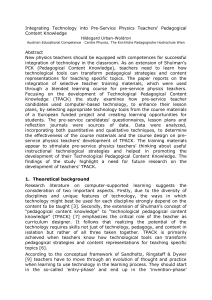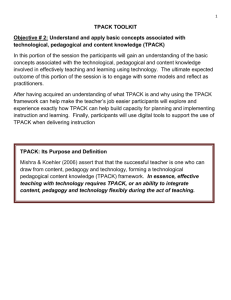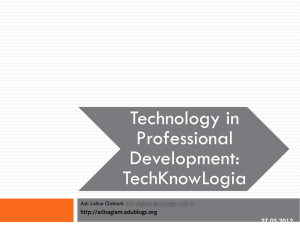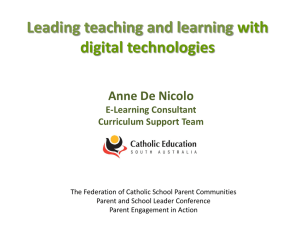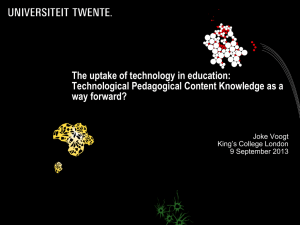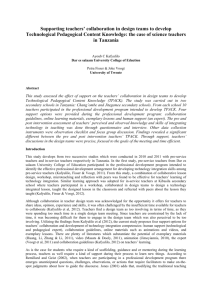here - Memorial University of Newfoundland
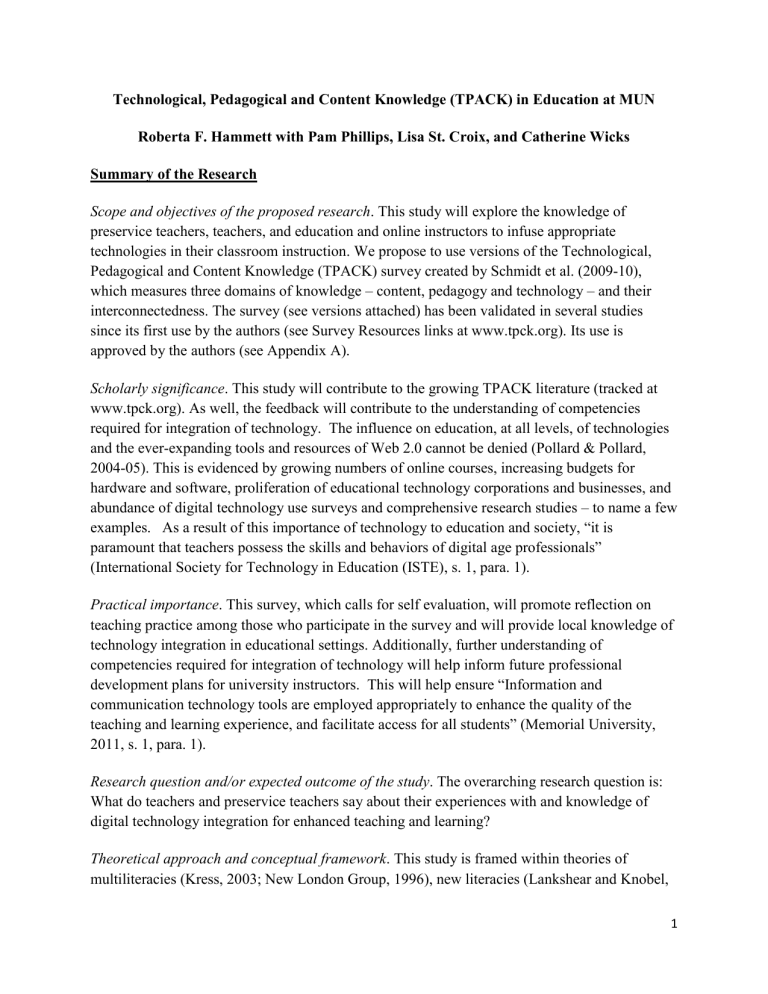
Technological, Pedagogical and Content Knowledge (TPACK) in Education at MUN
Roberta F. Hammett with Pam Phillips, Lisa St. Croix, and Catherine Wicks
Summary of the Research
Scope and objectives of the proposed research . This study will explore the knowledge of preservice teachers, teachers, and education and online instructors to infuse appropriate technologies in their classroom instruction. We propose to use versions of the Technological,
Pedagogical and Content Knowledge (TPACK) survey created by Schmidt et al. (2009-10), which measures three domains of knowledge – content, pedagogy and technology – and their interconnectedness. The survey (see versions attached) has been validated in several studies since its first use by the authors (see Survey Resources links at www.tpck.org). Its use is approved by the authors (see Appendix A).
Scholarly significance . This study will contribute to the growing TPACK literature (tracked at www.tpck.org). As well, the feedback will contribute to the understanding of competencies required for integration of technology. The influence on education, at all levels, of technologies and the ever-expanding tools and resources of Web 2.0 cannot be denied (Pollard & Pollard,
2004-05). This is evidenced by growing numbers of online courses, increasing budgets for hardware and software, proliferation of educational technology corporations and businesses, and abundance of digital technology use surveys and comprehensive research studies – to name a few examples. As a result of this importance of technology to education and society, “it is paramount that teachers possess the skills and behaviors of digital age professionals”
(International Society for Technology in Education (ISTE), s. 1, para. 1).
Practical importance . This survey, which calls for self evaluation, will promote reflection on teaching practice among those who participate in the survey and will provide local knowledge of technology integration in educational settings. Additionally, further understanding of competencies required for integration of technology will help inform future professional development plans for university instructors. This will help ensure “Information and communication technology tools are employed appropriately to enhance the quality of the teaching and learning experience, and facilitate access for all students” (Memorial University,
2011, s. 1, para. 1).
Research question and/or expected outcome of the study . The overarching research question is:
What do teachers and preservice teachers say about their experiences with and knowledge of digital technology integration for enhanced teaching and learning?
Theoretical approach and conceptual framework . This study is framed within theories of multiliteracies (Kress, 2003; New London Group, 1996), new literacies (Lankshear and Knobel,
1
2003) and integration of digital technologies for enhanced teaching and learning (Gordon, 2000;
Hicks, 2009; Wiske, 2004), all of which assert and demonstrate the importance of digital technologies and changing literacies in the futures of k-12 students and thus preservice and teachers. The study also rests within sociocultural and constructivist theories which explain how such concepts as scaffolding, collaboration, social interaction and zone of proximal development support learning (Vygotsky, 1978; Warschauer, 1997). As explained by the originators of the
TPACK framework (Mishra & Koehler, 2006), this theory is founded on solid pedagogical research.
Research plans and methods . In the first instance, the survey will be made available to preservice teachers (approximately 425), graduate teachers (approximately 850) and online instructors
(approximately 185) at Memorial University during spring semester 2012. Follow-up surveys may also be administered, using the same surveys, in subsequent years to track the development of technology use and to expand the numbers of instructors, on and off line, who are surveyed.
Data analysis will be achieved using SPSS software, following the guidelines of the survey’s originators (see www. tpck.org).
Dissemination . Conference presentations and proceedings through American Association of
Computers in Education (AACE) organizations, including E-Learn, Society for Information
Technology and Teacher Education (SITE), and Education and Information Technology Digital
Library (EdITLib) – see http://www.aace.org/ There are several peer- refereed journals associated with these organizations. I will also present at Canadian Society for the Study of
Education (CSSE) and publish in their peer- refereed journals (e.g., Canadian Journal of
Education).
Recruitment. Graduate, undergraduate and online DELTS and Education instructors will be recruited to complete the survey through emails and posters in the Education building.
References
Gordon, D. T. (Ed.). (2000). The digital classroom: How technology is changing the way we teach and learn . Cambridge: Harvard Education Letter.
Hicks, T. (2009). The digital writing workshop . Portsmouth, NH: Heinemann.
International Society for Technology in Education (ISTE). (n.d.). ISTE.NET-T: Advancing digital age literacy . Retrieved from http://www.iste.org/standards/nets-for-teachers.aspx
.
Kress, G. (2003). Literacy in the new media age. London: Routledge.
Lankshear, C. and Knobel, M. (2003). New literacies: changing knowledge and classroom practice . Buckingham, UK: Open University Press.
2
Memorial University of Newfoundland. ( 2011, May). A comprehensive framework for teaching and learning at Memorial University . Retrieved from http://www.delts.mun.ca/faculty/teachinglearning/
Mishra, P., & Koehler, M.J. (2006). Technological pedagogical content knowledge: A framework for integrating technology in teacher knowledge. Teachers College Record,
108 (6), 1017-1054.
New London Group. (1996). A pedagogy of multiliteracies: Designing social futures. Harvard
Educational Review, 66, 60
–
90.
Pollard, C., & Pollard, R. (2004-05). Research priorities in educational technology: A Delphi study. Journal of Research on Technology in Education, 37 (2), 145-160.
Schmidt, D. A., Baran, E., Thompson A. D., Koehler, M. J., Mishra, P. & Shin, T. (2009-10).
Technological pedagogical content knowledge (TPACK): The development and validation of an assessment instrument for preservice teachers. Journal of Research on
Technology in Education, 42 (2), 123-149.
Vygotsky, L. (1978). Mind in society: The development of higher psychological processes.
Cambridge, MA: Harvard University Press.
Warschauer, M. (1997). Computer-mediated collaborative learning: Theory and practice.
Modern Language Journal, 81 (3), 470-481.
Wiske, S. (2004). Using technology to dig for meaning. Educational Leadership, 62 (1), 46
–
50.
3
Appendix A: Consent to Use Survey
Re: using tpack survey
Monday 5/14/2012
Matthew J Koehler [mkoehler@msu.edu]
Roberta,
You don't need permission to use the TPACK survey (see http://mkoehler.educ.msu.edu/unprotected_readings/TPACK_Survey/tpack_survey_v1point1.pdf
). But if you need it in writing, I officially give you permission to use it!
Sincerely,
~Dr. Matthew J. Koehler
----- Original Message -----
From: Hammett, Roberta
To: mkoehler@msu.edu
Sent: Monday, May 14, 2012 8:11 AM
Subject: FW: using tpack survey
Hello Matt,
I have, about a month apart, sent email requests to Denise regarding the TPACK survey (see below). I regret that I have not received response and do not want to keep sending in fear there are problems in her life.
Will you respond to me or suggest another member of the team that I should contact?
I will be happy to share publications related to TPACK and perhaps, in future, assist with the site maintenance.
I appreciate your assistance. Roberta
Roberta F. Hammett, PhD
Professor (Literacies, Secondary English Education)
Faculty of Education (Office # 3014). Memorial University of Newfoundland
St. John's, NF A1B 3X8
4
